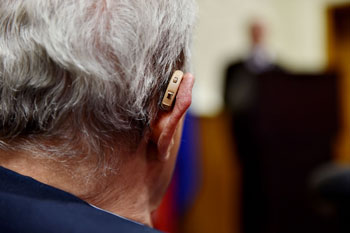Making the Connection: Hearing Loss & Cognitive Decline
 Did you know that adults even a mild hearing loss have a higher risk for dementia? And, those with severe hearing loss have five times the risk of getting dementia. In fact, studies have found that hearing loss not only can accelerate dementia, it can also cause cognitive decline.
Did you know that adults even a mild hearing loss have a higher risk for dementia? And, those with severe hearing loss have five times the risk of getting dementia. In fact, studies have found that hearing loss not only can accelerate dementia, it can also cause cognitive decline.
Hearing loss is no longer just a process of aging it is also linked to cognitive decline. Recent research has found patients with even mild hearing loss are twice as likely to experience cognitive disorders. Patients with moderate to severe hearing losses that were not treated were at up to five times the risk for memory and cognitive disorders.
Researchers have found that when you strain to hear, you are straining your brain. While you hear with your ears, the sound is processed and interpreted by your brain. When your brain has to strain to understand what is being said, it actually harms your brain.
Many patients put off getting their hearing evaluated due to fear that they will need a hearing aid. However, there are medical reasons for hearing loss as well any many advances in technology that enable patients to get back in the conversation.
In addition to cognitive decline, hearing loss is also linked to depression, social isolation, balance disorders and anxiety.
What can be done to correct hearing loss?
Technology is improving all the time and the new hearing aids available today can be controlled with a smartphone.
The new devices can regulate hearing in background noise to help you better hear the person you are speaking to. For many of my patients even with mild to moderate hearing loss, these devices allow them to feel confident interacting with others again.
Hearing aids are near-field devices, meaning you will hear the noises closer to you better than you will hear noises at a distance. There are assistive devices that you can attach to a hearing aid to hear noises at a greater distance.
For patients with severe to profound hearing loss, I often recommend a Bone Anchored Hearing Aid (BAHA) or a Cochlear Implant. These two devices have shown great success for those with very compromised hearing.
When clients first come to my office, the first step is doing a hearing test. After the test, the client and I review the audiogram. The audiogram is a chart showing which pitches and tones the patient hears well and those that they have difficulty hearing. Also, on this graph I can demonstrate how loud the sound needs to be before the patient hears it.
It’s a very thorough test, so I am able to give them specific information about their type and severity of the hearing loss.
Early signs of hearing loss
It might be time to have your hearing tested if:
- If you have to ask people to repeat themselves often
- If you hear a person talking, but cannot understand what they said
- If you have ringing or buzzing (tinnitus) in your ears
- If you have trouble hearing the television or when talking on the phone
- If you answer a question that wasn’t asked because you misheard the question
- If you have dizziness or vertigo (can often be tied to hearing)
- If you failed a hearing test at your primary care practice.

Jean Davison, AuD, is an audiologist with Beebe Audiology. To make an appointment for yourself or your partner, call (302) 645-4801.
